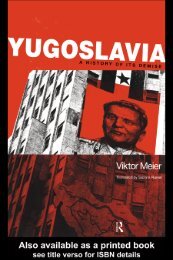Equality, Participation, Transition: Essays in Honour of Branko Horvat
Equality, Participation, Transition: Essays in Honour of Branko Horvat
Equality, Participation, Transition: Essays in Honour of Branko Horvat
Create successful ePaper yourself
Turn your PDF publications into a flip-book with our unique Google optimized e-Paper software.
6 <strong>Horvat</strong>’s Contributions to Economic and Social Theory<br />
By the start <strong>of</strong> World War II, alternative economic models had been<br />
narrowed to those <strong>of</strong> either the Soviet command economy or European<br />
social democracy types. The former had its roots <strong>in</strong> Len<strong>in</strong>ist pragmatic<br />
adaptations <strong>of</strong> Marx’s ‘scientific socialism’ after the Bolshevik revolution<br />
<strong>in</strong> the newly named Soviet Union. The latter was based <strong>in</strong> the<br />
‘evolutionary socialist’ thought <strong>of</strong> such European parliamentary based<br />
democrats as Edward Bernste<strong>in</strong> and Sidney and Beatrice Webb. In the<br />
one, the means <strong>of</strong> production became appropriated by the state; <strong>in</strong> the<br />
other, they rema<strong>in</strong>ed substantially <strong>in</strong> private hands while the state<br />
appropriated the regulatory and distributional means to re-allocate a<br />
share <strong>of</strong> the proceeds from capital accumulation.<br />
The irony <strong>of</strong> the nam<strong>in</strong>g <strong>of</strong> the post-Bolshevik society as ‘soviet’ did<br />
not escape the young <strong>Horvat</strong> and his Yugoslav compatriots as they<br />
embarked upon the project <strong>of</strong> a third way, between the anti-democratic<br />
consequences <strong>of</strong> the command economy and the limited transformation<br />
<strong>of</strong> society wrought by the capitalist economy <strong>of</strong> social democracy.<br />
Their task – and <strong>Horvat</strong> became its primary theoretician – was to propose<br />
a way to extend the democratic project beyond social democracy;<br />
adapt the economic efficiency <strong>of</strong> capitalism to a market-socialist formation;<br />
achieve, organically, a more just distribution <strong>of</strong> the proceeds <strong>of</strong><br />
capital accumulation, all the while rema<strong>in</strong><strong>in</strong>g faithful to the fundamental<br />
tenets <strong>of</strong> socialism. 1<br />
The answer was <strong>in</strong> one pr<strong>in</strong>ciple, locat<strong>in</strong>g ownership with society –<br />
not the state or the private – which came to be called social ownership<br />
and economic management <strong>in</strong> workers’ councils. In the political realm,<br />
the parliament rema<strong>in</strong>ed as it was under European social democracy –<br />
a regulator, adjudicator <strong>of</strong> economic conflict, <strong>in</strong>vestor <strong>in</strong> the public<br />
goods societies need – while the decentralized workers’ council became<br />
the arena <strong>in</strong> which all work<strong>in</strong>g members <strong>of</strong> society exercised the <strong>in</strong>fluence<br />
denied them <strong>in</strong> both the command and capitalist economies.<br />
‘Economic organizations’, argued <strong>Horvat</strong>, ‘are transformed <strong>in</strong>to selfgovern<strong>in</strong>g<br />
associations and capitalism is replaced by socialism.’<br />
(<strong>Horvat</strong>, 1969: 23). 2 And the central organiz<strong>in</strong>g proposition <strong>of</strong> this system<br />
was social ownership – ‘this is the source <strong>of</strong> its unity’, writes<br />
<strong>Horvat</strong> (1969: 92), who goes on to use Joseph Schumpeter’s characterization<br />
<strong>of</strong> this arrangement as ‘associationist socialism.’ 3<br />
<strong>Horvat</strong> has a deep and abid<strong>in</strong>g belief <strong>in</strong> the ability <strong>of</strong> employees to<br />
carry out the necessary functions <strong>of</strong> the enterprise be they managerial,<br />
entrepreneurial or allocational. Technical decisions, he contends, can<br />
be separated from other policy problems and properly assigned to pr<strong>of</strong>essionals.<br />
These premises need to be qualified, <strong>in</strong> my view. <strong>Horvat</strong> and

















